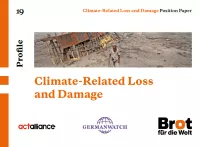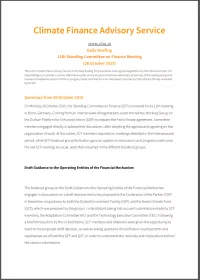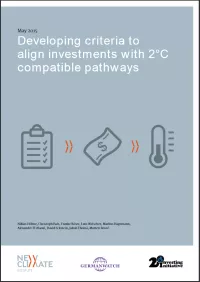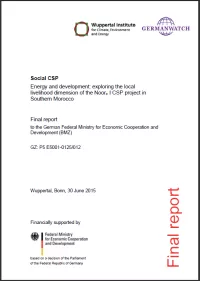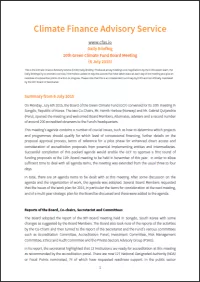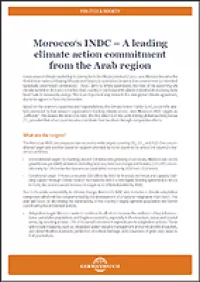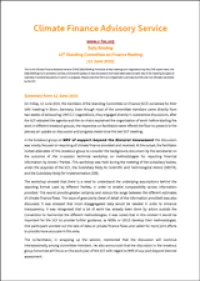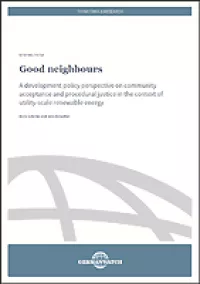Aktuelles zum Thema
Blogpost
Blogpost by Rixa Schwarz, October 2015
Laut des Beschlusses der UN-Klimakonferenz in Lima im Dezember 2014 sollen alle Staaten ihre nationalen Klimaschutzpläne im Laufe des Jahres 2015 vorlegen. Diese selbst gesteckten, nationalen Minderungsbeiträge, sogenannte INDCs (intended nationally determined contributions), stellen eine wichtige Grundlage für ein neues globales Klimaabkommen dar, welches in Paris im Dezember 2015 geschlossen werden soll. Kurz nach Ende der Frist am 1. Oktober, bis zu der die Staaten ihre INDCs vorlegen sollten, fand das INDC Forum in Rabat vom 12.-13. Oktober 2015 statt.
Publication
A Position Paper by Brot für die Welt supported by ACT Alliance und Germanwatch
In August 2015 an unusually intense monsoon caused devastating floods and landslides leading to the death of many people across Asia. Particularly in Myanmar, the rain destroyed hundreds of thousands of homes and streets and flooded rice paddies. In its most recent report, the Intergovernmental Panel on Climate Change (IPCC) warns that climate change will increase the duration and intensity of such and similar extreme weather events (IPCC 2014b). This will also lead to an increase in climate- related loss and damage (L&D), either as a result of extreme weather events or associated with slow-onset climate change, when glaciers melt, permafrost thaws and sea levels rise.
Publication
26th to 28th October 2015, Bonn
This is the Climate Finance Advisory Service (CFAS) Daily Briefing.
Publication
Climate Finance Advisory Service (CFAS) - Daily Briefing from the 26th Adaptation Fund Board Meeting
6th to 9th October 2015, Bonn
This is the Climate Finance Advisory Service (CFAS) Daily Briefing.
Publication
The German government, through the German Federal Environment Agency, commissioned a consortium consisting of NewClimate Institute, Germanwatch, and the 2° Investing Initiative to explore criteria to measure the alignment of investment and financing with the 2°C limit. The project focuses in particular on development finance institutions.
Publication
This study conducted by Germanwatch and the Wuppertal Institute explores how the social pillar of sustainability at the local level could be met in low-carbon energy projects. For this purpose, it evaluates the livelihood dimension of Concentrated Solar Power (CSP) technology based on a case study conducted on the 160 MW pilot CSP plant Noor I in Ouarzazate, Morocco.
Publication
6th to 9th July 2015 in Songdo (South Korea)
The Daily Briefings - produced at key meetings and negotiations by the Climate Finance Advisory Service (CFAS) expert team - try to provide a concise, informative update on key discussions that have taken place at each day of the meeting and give an overview of substantive points of action or progress.
Please note that these are independent summaries by CFAS and not officially mandated by the GCF Board or Secretariat.
Publication
A new wave of climate leadership is coming from the African continent. On 5 June, Morocco became the third African nation, following Ethiopia and Gabon, to submit its climate action commitment (or Intended Nationally Determined Contribution - INDC). With its timely submission, the host of the upcoming UN climate summit in 2016 also is the first Arab country to put forward its plan to transition its economy from fossil fuels to renewable energy. This is an important step towards the new global climate agreement, due to be signed in Paris this December.
Publication
12th to 13th June 2015
This is the Climate Finance Advisory Service (CFAS) Daily Briefing. Produced at key meetings and negotiations by the CFAS expert team, the Daily Briefings try to provide a concise, informative update on key discussions that have taken place at each day of the meeting and give an overview of substantive points of action or progress. Please note that this is an independent summary by CFAS and not officially mandated by the SCF.
Publication
A development policy perspective on community acceptance and procedural justice in the context of utility-scale renewable energy
Simply because utility-scale renewable energy (RE) projects substitute for fossil fuel plants does not per se imply that they will result in sustainable, equitable or even pro-poor development outcomes in the environments in which they are embedded and on the people they serve...


